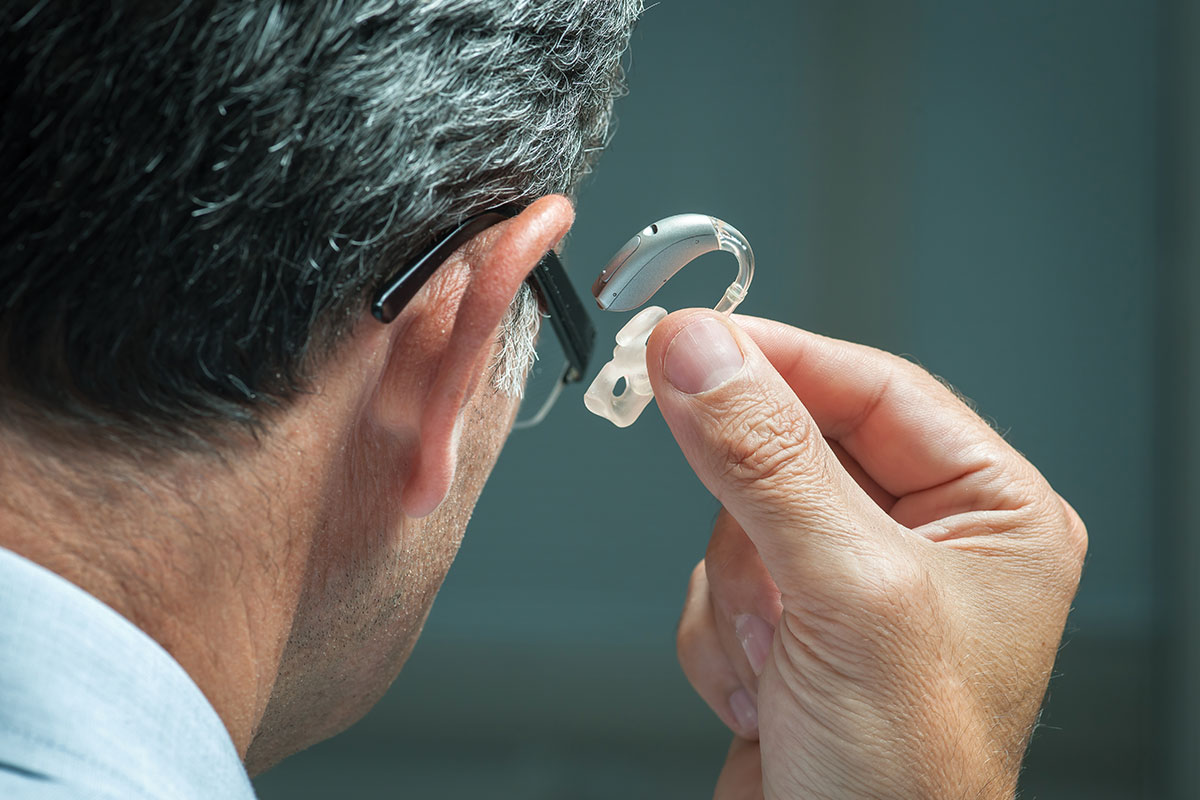When someone mistakes one word for another — like “job” for “hog” — it can lead to some humorous anecdotes. As such mishaps increase, however, they tend to become less amusing. Hearing loss is frustrating for everyone, and the advice, “GET A HEARING AID!” is easier said than done.
According to the Hearing Loss Association of America, 48 million Americans experience hearing loss to some degree. Hearing loss, the Rockville, Maryland–based nonprofit reports, can affect a variety of things in a person’s life: physical, emotional, and mental health; social skills; self-esteem; relationships; work and school performance; the perception of mental abilities; and actual cognitive decline. It shouldn’t be surprising that hearing loss, then, can lead to depression.
Yet, of those who got hearing aids, most waited an average of seven years before seeking treatment.
“Only 1 in 7 people with hearing loss tries to get hearing aids,” says Dr. Shankar Sridhara, assistant chief, Head and Neck and Mohs Surgery, Kaiser Permanente, Virginia. “This is due to the financial barrier as well as the stigma that still exists around wearing hearing aids.”
Sridhara estimates that the cheapest prescription hearing aids cost around $2,500 per pair, while over-the-counter devices cost half of that or less.

Bringing Down Hearing Aid Costs
Congress first directed the Food and Drug Administration to begin the process of making hearing aids more readily available by passing the Over-the-Counter Hearing Aid Act of 2017 with the goal of making the devices more affordable and more easily accessible. It wasn’t until October 2022 that the FDA made OTC hearing aids a new category for purchase. Now, hearing aids are available in stores and online from places like Walmart and Best Buy.
A quick internet search reveals a huge price range between the lowest OTC and the highest prescription hearing aids. OTC versions range from around $200 to $2,000 per pair, while prescription hearing aids range from about $2,000 to $8,000 per pair. Although available singly for half of these prices, most people need a pair of hearing aids.
Costs vary based on the type of hearing aid, such as whether it sits behind the ear or in the ear canal and how visible it is. Expect prices to rise if you add more personal service, features, and customization.
Clearly, it is possible to save money by buying OTC hearing aids. The question is, will they work for you?
Know What You’re Getting
Dr. Selena Briggs, vice chair of the Department of Otolaryngology at MedStar Washington Hospital Center, cautions people to do their homework before buying hearing aids solely based on price.
“Lower-price options may not have the best features,” Briggs says. “People with higher frequency hearing loss may not be helped with over-the-counter models because they aren’t pitch matched.”
In other words, people have different types of hearing loss, at different frequencies, which affect the sounds they’re missing. High-frequency sounds include whistles, screams, and the buzz of a mosquito. You may have heard that dogs hear higher frequencies than humans do, which is why a dog may be upset over a high-frequency whistle that you don’t even hear.
Low-frequency sounds include the rumblings of thunder and earthquakes, bullfrogs croaking, and cats purring. Human speech falls somewhere in between, in medium-frequency sound.

Comparing OTC and Prescription Hearing Aids
People sometimes think frequency and volume mean the same thing, but they do not. Although whistles and screams can be loud, other high-frequency sounds — like mosquitos buzzing — are not particularly loud.
This is why simple hearing aids that only allow the user to adjust the volume may not work that well. They’re not much better than sound amplifiers, which turn up the volume for the one wearing them — so the TV doesn’t have to be excruciatingly loud for everyone in the room — and have been commercially available for many years. Still, simple hearing aids may work for some people, and they are at the cheaper end of the OTC price range.
As Sridhara says, “They’re better than doing nothing.”
With prescription hearing aids, the audiologist can adjust them to provide every user the exact corrections needed to hear well and fit them in or behind the ear in a way that’s comfortable for the user. This does mean, however, that users may need to go back to their audiologist for adjustments. Most of the time, these extra visits are part of the cost of the hearing aids, although some audiologists may limit the number of included follow-up visits, so be sure to ask if you opt for prescription hearing aids.
Some of the more expensive OTC models have some customization. The companies may have online staff to work with you to get the most from your purchase, or allow you to upload your hearing test for them to make adjustments according to your hearing loss.
Check Insurance and Financing
Briggs also advises that people check their insurance to see whether hearing exams and hearing aids are covered or partially covered.
“In the last five to seven years, insurance plans have started to cover some of the cost, so be sure to check your plan,” Briggs says.
Original Medicare, the federal health insurance program for people 65 and older, does not cover any hearing aid costs, but many Medicare Advantage plans do. (Medicare Advantage, also known as Part C, is an option provided by private companies approved by Medicare that people can choose in addition to the government’s original coverage.) Each plan provides different coverage, however, so it’s important to check with yours if you have a Medicare Advantage plan or with your insurer.
In addition, most OTC and prescription hearing aid companies or audiologists offer payment plans.
One benefit of OTC hearing aids is that they increase competition in the hearing aid industry, which could have the effect of lowering prices for prescription hearing aids as well. Sridhara hopes the increased availability will chip away at the stigma, too, so that those with hearing loss will improve their health and quality of life by finally getting the hearing aids they need.
What to Consider Before Buying an OTC Hearing Aid
- What does it cost? Is that cost for one hearing aid or a pair?
- Is there a trial period?
- What is the return policy?
- What is the warranty? Does it cover losing the hearing aid?
- What happens if it stops working? Can I get it repaired?
- Is it waterproof?
- Does it need batteries? If so, what type?
- Do I need a cellphone or remote-control device to control it?
- Will it work with my iPhone or Android?
- Do I need to install an app to use it?
- Is it Bluetooth compatible?
- What if it doesn’t fit?
- Does the company provide online support or a telehealth option?
- How much does insurance or Medicare Advantage cover?
- Can I use a Health Savings Account or Flexible Spending Account to buy it?
Feature image, stock.adobe.com
This story originally ran in our September issue. For more stories like this, subscribe to Northern Virginia Magazine.





